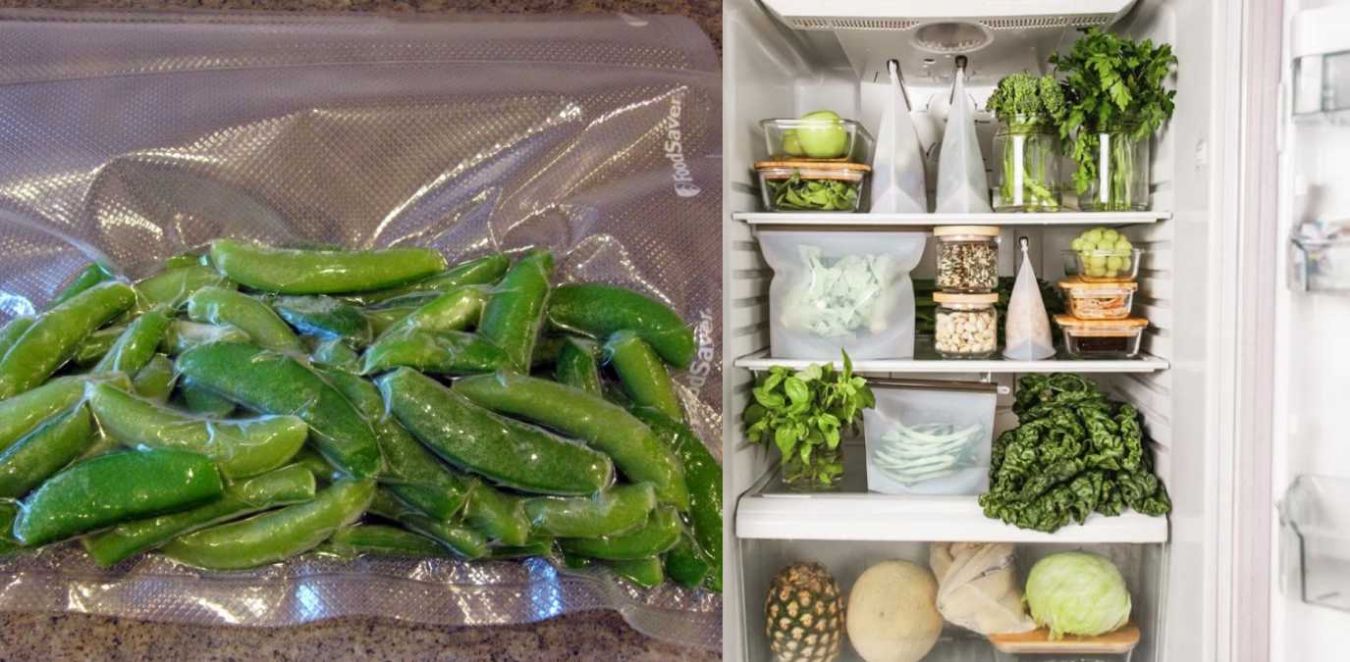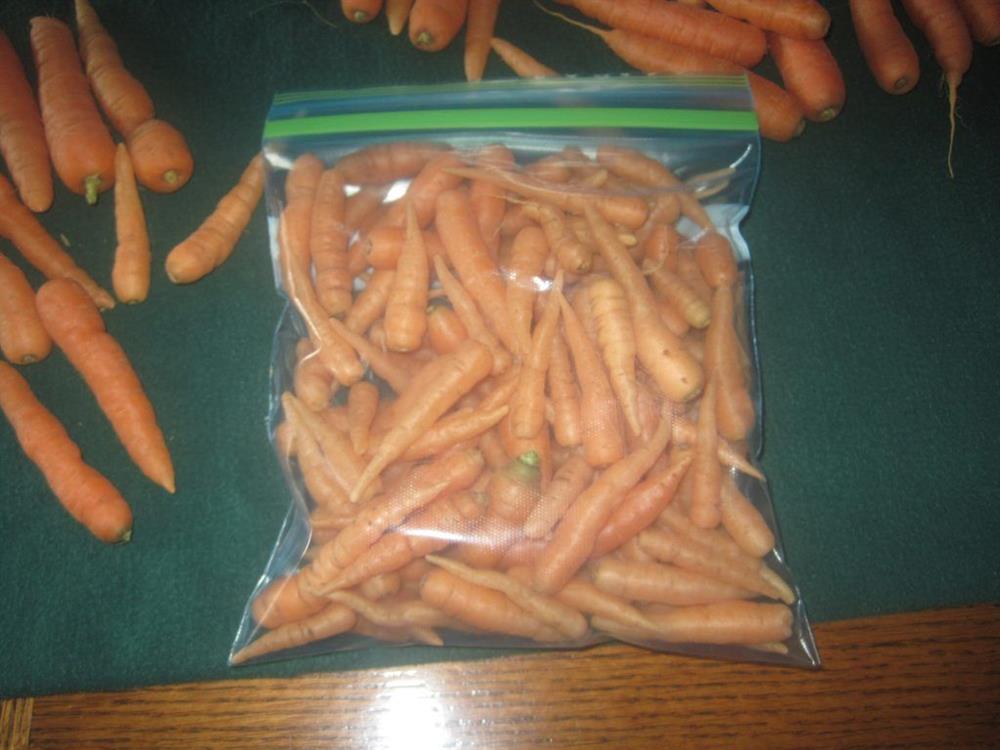When you shop for several days' worth of groceries at once, you face the problem of ensuring your fresh vegetables and fruits stay fresh as long as possible.
As a result, there is no universally optimal method for storing vegetables, herbs, and fruits near me. Depending on their life expectancy, certain practices, such as peeling or washing, can prolong or shorten their lifespan. Grouping all the fresh vegetables, fruits, and herbs together can also shorten or prolong their lives.
It is important to follow these general guidelines regardless of the method chosen:
- Make sure you only eat fresh produce.
- Start the preservation process as soon as the harvest is complete.
- Do not consume damaged, cut, bruised, or diseased produce.
- All preserved produce must be consumed within one year after storage.
Storage of fresh veggies, herbs, and fruits is not difficult as it feels. For storage guidelines and tips to keep your fruits, vegetables, and herbs fresh for as long as possible, read on.
Storage Of Fresh Products Inside And Outside The Refrigerator Near Me
Preserve the freshness of your food near me! Refrigeration is not necessary for all produce. Find out how to store different kinds of vegetables, fruit, and herbs.
There are three different conditions in the storage of fresh produce. They are:
- In a cool and dry place (50 to 60°F and 60% humidity), such as an unheated basement.
- Dry and cold place (32 to 40°F and 65% humidity), for example in an unheated garage or refrigerator.
- Cold and moist place (32 to 40°F and 95% humidity), such as inside a refrigerator (with the humidity provided by a perforated plastic bag) or in a root cellar.
Cold, moist conditions are ideal for fruit and vegetables, which can be maintained most easily in a refrigerator. Refrigerators can also cause produce to dry out, so in order to increase relative humidity, it's a good idea to store it in perforated bags or in the crisper drawer.
The kitchen, mudroom, or basement is often a good place to store vegetables and fruit that do best in cool, dry conditions. See below for the best options!
Note: Before eating, you should always wash your produce well.
Storage Of Fresh Vegetables Near Me
The following list illustrates which vegetables should be stored in a refrigerator, root cellar, or outside the refrigerator.
A. How To Store Fresh Vegetables In The Refrigerator Or Root Cellar
The refrigerator is an ideal place to keep produce because most fruits and vegetables store well in cold, moist conditions. To increase relative humidity, store produces in a produce drawer or in perforated plastic bags, since refrigerators tend to dry out produce. Root crops such as carrots or beets can be stored in root cellars for long periods of time.
1. Asparagus
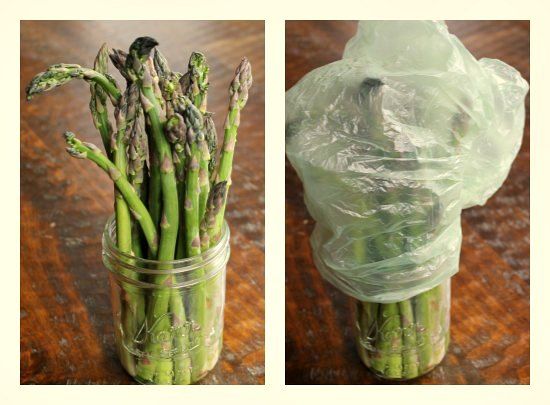
Image source : Pinterest
- You can store asparagus spears upright in a container containing about an inch of water such as a glass or jar.
- Place a produce bag over the asparagus loosely.
- The asparagus should keep for 10-14 days.
2. Broccoli
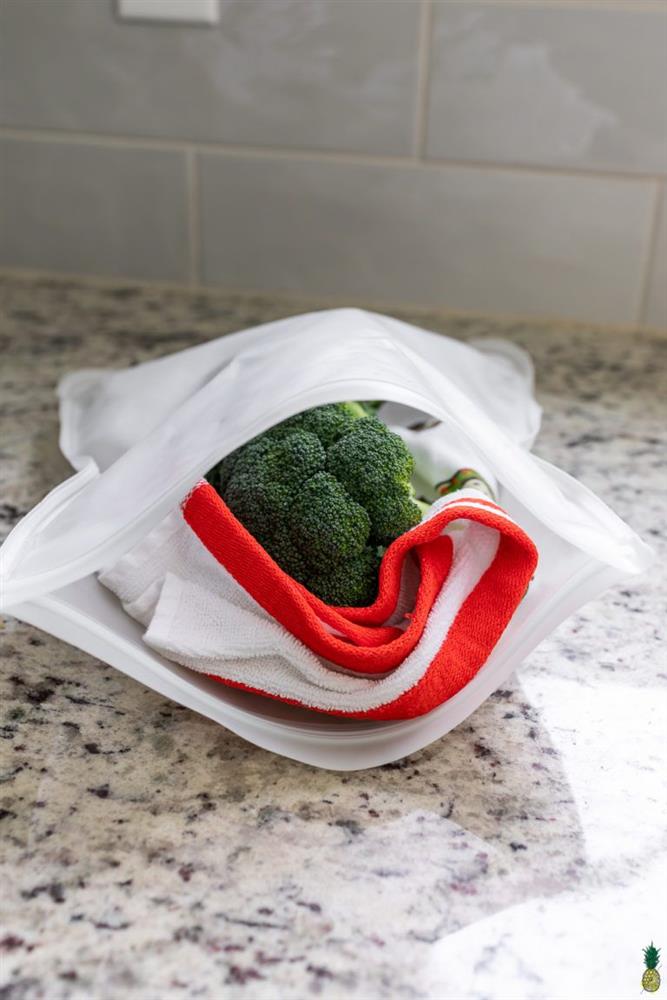
Image source : Pinterest
Sprouts can be stored for up to a month in a perforated plastic bag in the refrigerator.
3. Beans
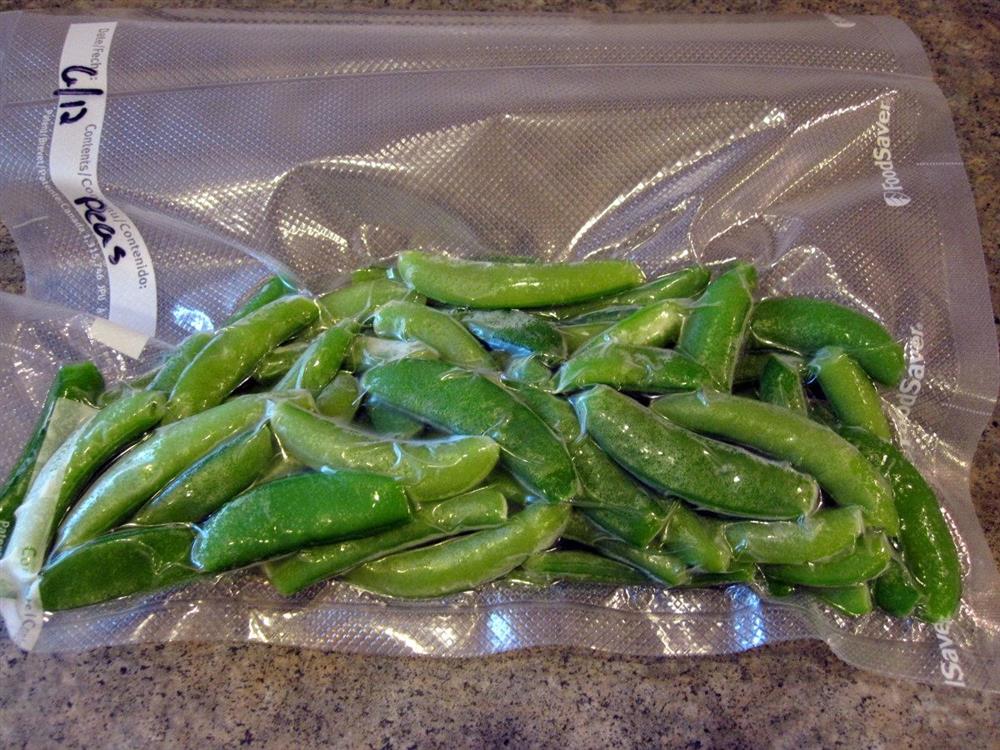
Image source : Pinterest
- In the refrigerator, place snap beans, such as green beans, in a bag with perforations.
- They will deteriorate more quickly if kept below 40°F.
4. Cauliflower
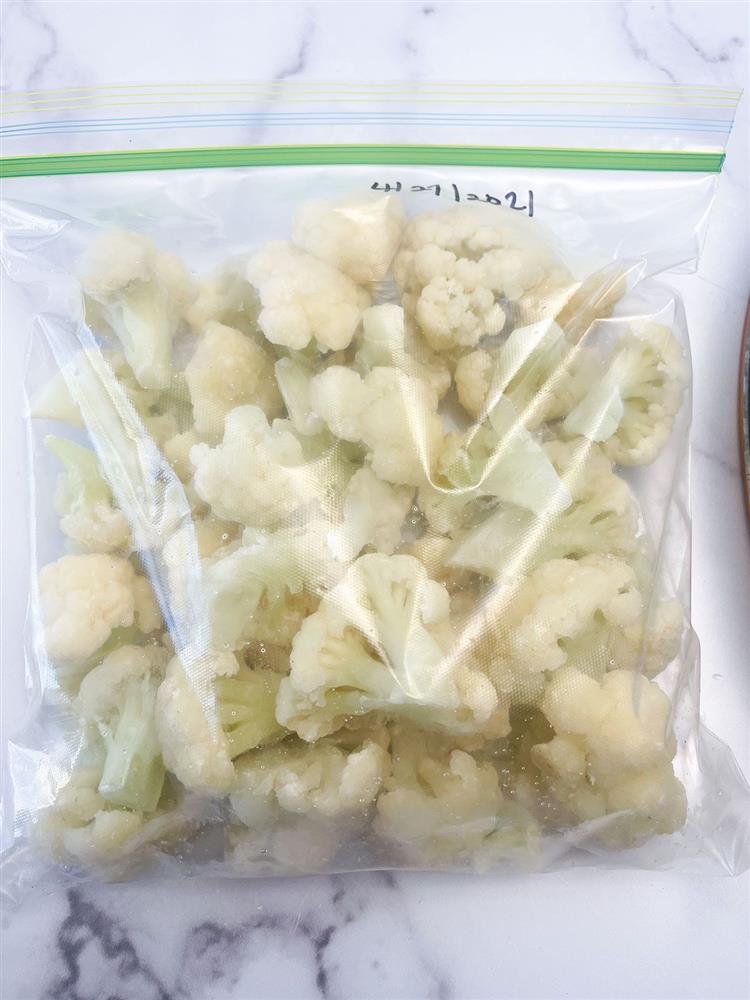
Image source : Pinterest
- Perforated plastic bags should be used to store cauliflower in the refrigerator.
- Storage should last 2 to 3 weeks if it is not washed beforehand.
5. Cabbage
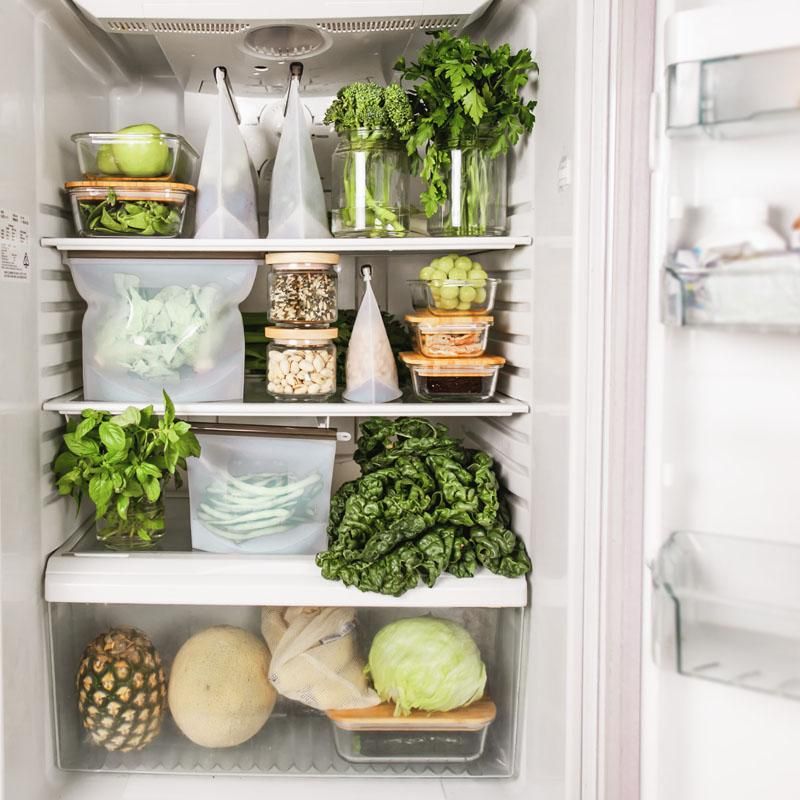
Image source : Pinterest
Cabbage can be stored for up to four to five months in the refrigerator's produce drawer.
6. Radishes
.jpg)
Image source : Pinterest
- Radishes are hardy in cold temperatures.
- Perforated plastic bags can be stored in the refrigerator for up to a month.
7. Carrots, Beets, Turnips, and Parsnips
Image source : Pinterest
A root cellar or a refrigerator properly should be used for root crops such as carrots, parsnips, beets, and turnips.
- You can store small amounts in a perforated plastic bag in the refrigerator for two to three weeks.
- Keep large amounts of dried herbs in a root cellar or other dark, cool, humid place.
- Make sure any soil clinging to the roots is brushed off.
- Tops that are still attached should be twisted or cut one-half to one inch above their roots.
- The roots should be buried in the sand.
- Add a layer of slightly damp sand to the bottom of a polyethylene bag with breathing holes or a bucket with a 5-gallon capacity.
- In the container, add a layer of carrots and sand. The storage temperature should be just above freezing.
B. How To Store Vegetables Outside The Refrigerator
It is best to store some vegetables outside of the fridge since they are susceptible to cold damage at temperatures below 40°F. Make sure they are kept in a cool (55°F) part of the kitchen, pantry, or mudroom.
1. Cucumbers
- In the refrigerator, cucumbers can be stored for a few days; however, a cool spot in the kitchen will preserve them longer.
- Perforated plastic bags will keep them for up to ten days.
2. Zucchini
- During the summer, zucchini and other squashes can be stored in the refrigerator for a few days.
- You can store them longer than this in a perforated plastic bag in a cool part of the kitchen.
- They are good for 10 to 14 days.
3. Potatoes
- Potatoes should never be refrigerated as the starch will turn to sugar.
- Keeping the plant in a dark, cool place that is about 40°F (4.5°C) will prevent soil from clinging to it.
- Create a storage area with plastic bins lined with wet sand in the basement, where it will be the coldest and darkest.
- Potatoes prefer a warmer environment than other root crops, so store them higher up.
- Store potatoes away from onions and apples, as they emit ethylene gas which can spoil the potatoes.
4. Onions, Garlic, and Shallots
- Onions, garlic, and shallots should never be kept in the refrigerator.
- They should be stored in a dry, cool (40 to 50°F), ventilated place.
- The best way to get that ventilation is to store them in mesh bags.
- If this is not possible, put them in a bowl in your pantry.
- Make sure you have plenty of ventilation holes if you cover it with a bag.
- Potatoes and onions should not be stored together! They do not get along.
- Potatoes release moisture, which accelerates onion deterioration.
- You can store scallions and green onions in the refrigerator.
5. Tomatoes
- You should store this product in a cool, shaded area.
- To ripen green tomatoes, layer them in a shallow box, separating each tomato with paper.
- In temperature ranges of 55°F to 70°F, they will take 25 to 28 days; at 65°F to 70°F, they will take 14 days.
- Fresh tomatoes should never be refrigerated if you wish to preserve their fresh taste.
Storage Of Fresh Fruits Near Me
A. How To Keep Fruit fresh In The Refrigerator
1. Apples
- For short-term storage, place apples in the refrigerator.
- For increased humidity, a fruit drawer and damp paper towel can be helpful.
- When you want apples to stay fresh, don't leave them out on the counter.
- When temperatures reach 70°F, apples ripen four times as quickly as when they are at 32°F, and they quickly become overripe.
- Apples should be stored in plastic bags at a temperature of 32°F.
- Temperatures between freezing and 45°F keep apples fresh for about six months.
- The same conditions can be approximated by a double cardboard box in a cool mudroom or cellar if you do not have a root cellar.
- It is important to give the apples some fresh air from time to time.
- Apple cider can be frozen after a small amount has been poured off to allow for expansion.
2. Berries (Strawberries, Raspberries, Blackberries, Blueberries)
- Never rinse before storing.
- This removes the thin, protective epidermal layer.
- Berry products are highly perishable and don't last long once opened.
- In order to store them, place them on a paper towel in a tightly covered container and keep them in the refrigerator for two to three days.
- Rinse them just before eating them.
3. Grapes
- Perforated plastic bags (the kind typically bought in the grocery store) in the refrigerator will keep grapes for 2 to 3 weeks.
4. Citrus (Oranges, Grapefruit, Lemons)
- You can store citrus products such as oranges, lemons, clementines, and grapefruit in the refrigerator in a perforated bag or a produce drawer.
5. Pears
- Pears that are unripe can be stored in the refrigerator for a few days.
- Move them out of the refrigerator a few days before you intend to eat them in order to allow them to ripen and develop a better flavor and texture.
- On the counter, keep them in a paper bag or perforated plastic bag.
6. Stone Fruit (Peaches, Cherries, Nectarines, Apricots, Plums)
- Perforated plastic bags can be used to store stone fruit in the refrigerator.
- During cold, humid weather, they'll last one to two weeks.
- Be on the lookout for blemishes or soft spots on your roofing, as moisture can lead to rot.
B. How To Store Vegetables Outside The Refrigerator
Tropical Fruit (Bananas, Avocado, Pineapple)
- In the refrigerator or in the freezer, tropical fruits do not keep well or retain their true flavor.
- In order to preserve their tropical flavor, store bananas, avocados, and pineapples at about 50°F outside the fridge.
How to Store Fresh Herbs Near Me
With a plastic bag tented over the stems of Dill and Parsley, the stems will last about two weeks. Most other herbs (and greens) can be kept for a short time unwashed and refrigerated in tightly–sealed plastic bags with just enough moisture to keep them from wilting. The best paper and cellophane for storing items longer are those that are permeable to moisture and gas. Plastic prevents oxygen from reaching plants and promotes spoilage.
Storage Of Fresh Herbs
In the refrigerator, fresh herbs quickly go bad. Have you ever noticed how basil or parsley leaves turn brown? It is best to keep these leafy herbs (like cilantro, mint, and dill) in a glass of cool water, like fresh flowers. Trim off the ends every few days and change the water. Pick leaves as you need them! This will encourage more growth. It is also possible to dry, freeze, and preserve herbs in vinegar, oil, and pesto (which should be kept frozen or refrigerated).
You can store some fresh woody herbs like
- Rosemary,
- Thyme,
- Chives,
- Sage, and
- Oregano
in the fridge by loosely wrapping them in the damp paper.
Heat and steam from the stove can cause dried herbs and spices to lose flavor, so they should be kept in a cool, dry place, not above the stove or right next to the burners.
Storage Of Raw Meat
Meat comes from animals that can carry bacteria that can cause us harm. As a result, it is crucial to store meat safely to prevent bacteria from growing.
Food can spoil or become unsafe if bacteria multiply rapidly. Bacteria are responsible for creating the slime, toxins, off colors, and odors associated with food spoilage. It is possible, however, for bacteria-causing diseases to grow without affecting the smell, color, or texture of the food.
This is why keeping meat cold enough to prevent bacteria from growing or heating it to a temperature that kills bacteria)is so important. The ideal temperature for bacterial growth on food spoilage is between 70° and 100°F. Bacteria tend to grow more slowly above and below this temperature range.
The temperature of your refrigerator should be between 34° and 40°F since most bacteria grow slowly, if at all, below this range.
Other Storage Tips For Fresh Fruits And Vegetables
- Green beans, rhubarb, and petite peas can easily be blanched and frozen and still taste great when thawed.
- Almost all fruits especially peaches can be canned well, and the added effort is usually well worth it. Cucumbers, beets, cranberries, tomatoes, and many other fruits can be canned easily.
- You can store eggs anywhere as long as they aren't falling. Eggs can be stored for up to two weeks.
Do’s and Don'ts for Buying and Storing Fresh Products
| Do's | Don'ts |
|---|---|
| 1. Keep raw materials away from other fresh food. | 1. Don't mix all food products while purchasing. |
| 2. For cleaning tough or dimpled produce like potatoes and melons, clean scrub brushes are helpful. | 2. Don't wash the berries, if you are going to eat them late. |
| 3. Always check the expiry date if you're buying from markets. | 3. Don't keep milk packets, or tomatoes on the bottom while purchasing. |
Conclusion
In the supply chain, fresh fruits, meats, and vegetables are notable and important. It is very important to store fresh fruits and vegetables properly.
You can avoid food-borne illness if you store food properly. Fresh fruits, meats, and vegetables should not be washed before storage.
Fruits and vegetables that appear extremely dirty after harvest can be rinsed and dried well before storing.
They should be washed under running water before eating. Use the above guidelines and tips for storing fresh produce near me.





